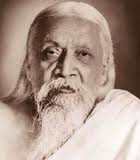 Aurobindo Ghosh (1872–1950) was an Indian nationalist, freedom fighter. He later turned into a world famous philosopher, yogi and guru. After education in England, he passed the famous ICS exam and joined the Baroda state service. When Bengal was partitioned, a nationalist campaign was carried out by groups of revolutionaries, led by Aurobindo Ghosh. He was one among the leads who established Jugantar, a main secret revolutionary group operated in Bengal. He was also the part of another revolutionary group, Anushilan Samiti. To take the extremists' view to the public, Bipin Chandra Pal had founded the nationalist Bengali newspaper Bande Mataram. Pal invited Aurobindo to become its editor along with Pal. Pal after a few issues discontinued contributing to the paper. The paper rapidly became a major success and the radical views finally found a popular voice. But as a result of its popularity and open espousal of aggressive methods, the paper came into frequent confrontation with the Raj.
Aurobindo Ghosh (1872–1950) was an Indian nationalist, freedom fighter. He later turned into a world famous philosopher, yogi and guru. After education in England, he passed the famous ICS exam and joined the Baroda state service. When Bengal was partitioned, a nationalist campaign was carried out by groups of revolutionaries, led by Aurobindo Ghosh. He was one among the leads who established Jugantar, a main secret revolutionary group operated in Bengal. He was also the part of another revolutionary group, Anushilan Samiti. To take the extremists' view to the public, Bipin Chandra Pal had founded the nationalist Bengali newspaper Bande Mataram. Pal invited Aurobindo to become its editor along with Pal. Pal after a few issues discontinued contributing to the paper. The paper rapidly became a major success and the radical views finally found a popular voice. But as a result of its popularity and open espousal of aggressive methods, the paper came into frequent confrontation with the Raj.
In 1907 the British decided to prosecute the group behind Bande Mataram, for its constant propaganda against British rule. Aurobindo was arrested but the prosecution was unable to establish that he was the editor of the paper and was acquitted. Pal was sentenced to six months in prison for declining to depose. After the Bande Mataram Case, Sri Aurobindo became the recognized leader of aggressive nationalism in Bengal. He was arrested again in 1908 in connection with the Alipore Bomb Case. He was acquitted in the ensuing trial and released after a year of isolated incarceration. Once out of the prison he started two new publications, Karmayogin in English and Dharma in Bengali. He also delivered the Uttarpara Speech, hinting the transformation of his focus to spiritual matters . A few months after Aurobindo retired from active politics and sailed to Pondicherry, where spent the rest of his life.
You might also interested in





0 comments: